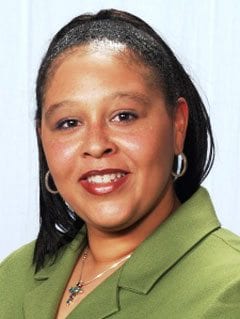
Dr. Tricia B. Bent-Goodley is an associate professor and chair of the Macro Practice Sequence at the Howard University School of Social Work in Washington, D.C. Her publications and research have largely focused on how domestic violence intersects with cultural competence, child welfare, prisoner reentry, adolescent violence, health and mental health, and faith- and community-based intervention development. She has authored or co-authored three books relating to social policy and people of color, and is an appointed committee member of the National Association of Social Workers’ National Committee on Women’s Issues.
Here, she takes a few moments to discuss some of the statistics and available information about the incidence of domestic violence in the African American community, including one recent high-profile celebrity case.
Should we be surprised by the Chris Brown/Rihanna situation?
This is a really tough situation. So many say, “We don’t know all of the evidence,” and that’s true — but a picture really does speak a thousand words.
Many wonder with all that Rihanna has, why doesn’t she just walk away? Domestic violence is complicated. It goes beyond what we have and speaks to many other facets of who we are — our belief systems, our personal life experiences, and the social and cultural expectations that guide us.
Both Rihanna and Chris Brown work in an industry that is driven by disrespecting and devaluing women. This business, coached in record sales that have no moral obligations, makes it acceptable to treat women in derogatory fashions. So I am not surprised, but [I am] hopeful that we will use this awful situation to better understand the nature of violence in our intimate relationships and how they are not just about the two people but all of us who turn our heads, downplay the violence or justify abuse.
What are the statistics on the prevalence of partner abuse in the African American community?
According to a study conducted by the U.S. Department of Justice in 2000, African American women experience domestic violence at a rate 35 percent higher than white women and 22 percent higher than women of other races. African Americans are more likely to suffer more lethal forms of violence, including being more likely to be killed by an intimate partner, compared to other populations. Domestic violence is a serious problem in the African American community that warrants grave attention.
As our economy has gotten worse over the past few months, many women’s shelters have seen an increase in the number of women and their children trying to escape an abusive situation. Does this indicate that economics plays a role here? Are middle-class and upper-middle-class men less likely to abuse their partner and families?
Economics definitely play a role with regard to domestic violence. We have already seen the number of domestic violence incidents increase in the past year since our current economic downfall began reaching greater proportions of the U.S. population. We also recognize that domestic violence takes place across all socioeconomic groups.
It is vital to understand that domestic violence is not limited to any one population of people based on any sociodemographic factor. However, those that are from lower economic classes are known to experience domestic violence at higher rates compared to those in middle- and upper-class homes.
It isn’t clear if this … is because there is a greater law enforcement presence in [lower-income communities] or because neighbors are more aware of the violence and [more likely to] call it in due to the proximal nature of how close apartments and homes may be in these communities. We know that middle- and upper-middle-class individuals tend to go to their primary care physician or seek mental health assistance as opposed to using public mechanisms of service, which are usually where research is conducted.
What help is available to these abusers? Should all abusers be sent to prison?
Batterers’ intervention programs are really critical for perpetrators of domestic violence. While [the programs] need significant improvement, they are important places to begin to provide services for men, to teach them why they are using violence to control their partner and what they can do alternatively to address their issues.
There are two organizations that I would recommend others consider modeling, and they are Men Can Stop Rape in Washington, D.C., and Men Stopping Violence in Decatur, Ga. These organizations not only address men’s perpetration of domestic violence, but they do it from a culturally competent standpoint and they engage the community. I have to say that while these men often may also need substance abuse services, it is not their substance abuse that causes their violent behavior. It is the choice they make to use violence and abuse to control their intimate partner, and that is what batterers’ intervention programs target changing.
Dr. Tricia B. Bent-Goodley is the author of “African American Social Workers and Social Policy” and “The Color of Social Policy.”


![Banner [Virtual] Art Gallery](https://baystatebanner.com/wp-content/uploads/2024/04/Cagen-Luse_Men-at-store-e1713991226112-150x150.jpg)



